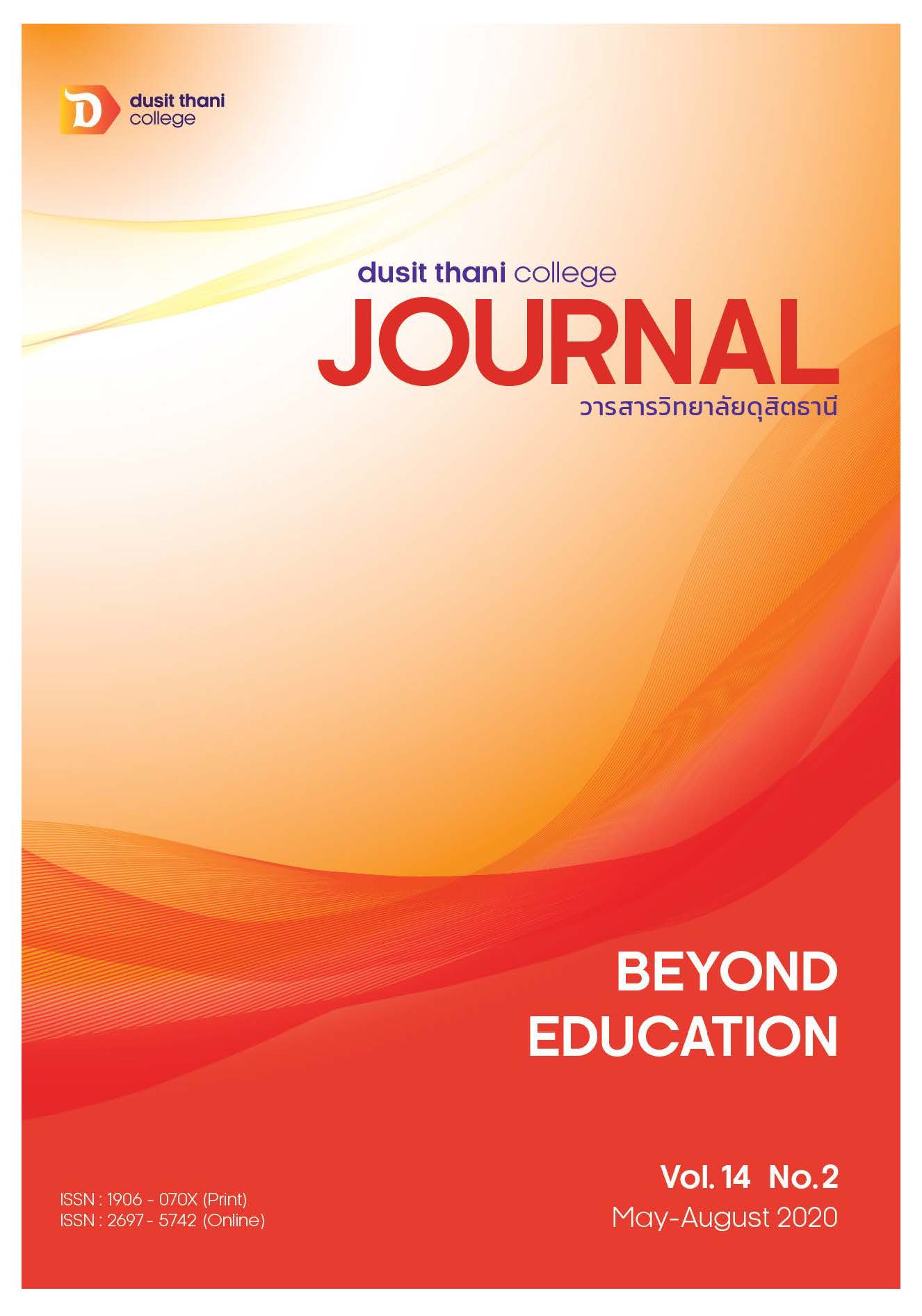A Study of the Operational Process According to the Quality Index of the Standard of Homestay Accommodation: A Case Study of Ban Amphawa Homestay, Amphawa District, Samut Songkhram Province
Main Article Content
Abstract
The purposes of this research were 1) to explores the characteristics of homestay operators in Ban Amphawa Homestay, Amphawa District, Samut Songkhram Province and 2) to analyze the comprehension of standard quality indicators of homestay in Ban Amphawa Homestay, Amphawa District, Samut Songkhram Province, using the qualitative research. The data were collected from the in-depth interview, as the tool, with 7 homestay operators. The names of the homestays are Ban Mae Arom Homestay, Ban Benhathip Homestay, Mae Sangiam Homestay, Ban Nai Fan Homestay, Moom Sabai Homestay, and Ban Waraporn Homestay. This list of homestays came from the samples that the author selected by purposive sampling. using open-ended questions prepared in advance. Data analysis included descriptive statistics.
Based on the research on the characteristics of homestay operators, it was found that most are female aged 60-70 and work as retired government officials with a bachelor degree and mainly earn from the welfare as a retired government official and additional income from the homestay business. The main objective in building the homestay business is seeing neighbors and relatives who previously run it and earn income to support the family. Therefore, they become the homestay operators. In terms of becoming the operator, they see the opportunity in building income so they build the business in their home area. For the duration of business operation, it is between 7 to 11 years. The main customers are Thai tourists who visit during the weekend. The number of accommodations provided for customers is 4 to 8 rooms and the number of staffs to take care of the business is 1 to 2 persons. It is a type of family business. As for the state of being the operators, all 7 operators have no experience and lack knowledge about the correct homestay administration. For the business expectation, they haven’t set the goal of business because they see it as an additional income.
According to the study in the understanding using of Homestay’s standard quality indicators, it was found that the sample operators understand the indicators but could not operate in accordance with all Homestay’s standard quality indexes. For the prioritization of 8 standard quality indexes, it was found that accommodation and food and nutrition are the main factors that the entrepreneurs see important to the business while safety, management, tourism activities, environment, value-added, and marketing promotion, they give slightly attention
Article Details
Article Screening Policy
- All research and academic articles to be published must be considered and screened by three peer reviews in the relevant field / article.
- All articles, texts, illustrations and tables published in the journal are the personal opinions of the authors. Editors don't always have to agree. And no responsibility whatsoever is the sole responsibility of the author.
- The articles to be published must never be published. Where did you first publish? And not in the consideration of other journals If the audit found that there has been a duplicate publication It is the sole responsibility of the author.
- Any article that the reader sees as being plagiarized or impersonated without reference. Or mislead the work of the author Please let the journal editor know it will be your greatest blessing.
References
Correction. New York : Appleton Century-Crofts.
Buapat, S. and Viravaidya, T. (2011). Alternative: The tourist’s satisfaction on home-stay
services in Amphawa district. Samutsongkram province based on the Thai
home-stay quality indications. Dusit Thani College. (in Thai)
Chantavanich, S. (2016). Qualitative Data Analysis. Bangkok: Chulalongkorn University
Printing. (in Thai)
Gee ,C.Y., Fayos-Sola, E. (1997) International tourism: A global perspective, Madrid
Imdeang, N. (2008). Enchancement the Readiness for Assessment Homestay Standard
of Bann Hua Hard Homestay Group, Muangmai Subdistrict, Amphawa District,
Samutsongkram Province. Dhonburi Rajabhat University. (in Thai)
Kiatipong U. (2018). PDCA Cycle / Quality Control or Deming Cycle. Electronic Journal of
(Online). Retrieved from: https://www.iok2u.com/index.php/article/innovation/240-pdca- cycle-deming-cycle
Office of Strategy for Province Development Group Samut Songkhram Provincial Office. (2018)
Samut Songkhram Provincial Development Plan 2018 - 2022 Revised Edition and
Provincial Annual Action Plan Budget year 2020
Office of the National Economic and Social Development. (2017). The Twelfth National
Economic and Social Development Plan (2017-2021). (Online). Retrieved from:
https://www.nesdb.go.th/nesdb_en/ ewt_dl_link.php?nid=4345. (2017, June 10). (in Thai)
Office of Tourism and Sport, Samut Songkhram Province. (2018). List of accommodation in
the Samut Songkhram Province. (Online). Retrieved from: https://samutsongkhram.
mots.go.th/more_news.php?cid=16. (2018, May 10). (in Thai)
Office of tourism development Ministry of Tourism and Sport. (2003). Homestay Standard
Thailand. (Online). Retrieved from: http://www.homestaythai.net/Homepages/ReadPage/2 (2018, May 14). (in Thai)
Phaknisa A. and Others (2007). Cultural tourism route development project
linked to Annual Tourism Festival in the Northeast region of Thailand. Bangkok:
Fund Office Support research.
Richards, G. and Pereiro X. (2006). Cultural Tourism: Negotiating Identities. Universidade de
Trás-Os-Montes e Alto Douro. ATLAS. Chaves, Portugal
Sinsoongsod, W. (2006). Literature review and conceptual framework. Bangkok:
Siammitr Printing. (in Thai)
Suthasinee P. (2015). PDCA is the key to continuous improvement. Electronic
Journal of Thailand Productivity Institute. Retrieved from: https://www.ftpi.or.th/2015 /2125 (2019, Nov 28). (in Thai)
The Chaipattana Foundation. (2012) (Online). Amphawachaipattananurak. Retrieved from:
http://www.amphawanurak.com/th/amphawanurak/process.php. (2019, Sep 10). (in Thai)
Walailak S. (2016). Listen to the sound of 'Mae Klong' on the day the 'Amphawa'
floating market is on the wind. Retrieved from: http://lek-prapai.org/home/view.php?id =406 (2019, Sep 10). (in Thai)
Wirawit L. (2011) (Online). Philosophy of PDCA circuits. Retrieved from:
http://business.east.spu.ac.th/admin/waaa_file/A37322PDCA.pdf (2019, Nov 28). (in Thai)


